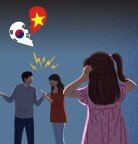N.K.: We never confiscated facilities from Hyundai Asan
N.K.: We never confiscated facilities from Hyundai Asan
Posted September. 22, 2014 00:27,
North Korea requested South Korea to make additional investment in Mount Kumgang and Wonsan areas, claiming that "it never confiscated the Souths property," which it had forfeited and frozen in April 2010. Oh Eung Kil, general president of Wonsan district development company under the Norths external economy ministry, told South Korean reporters at an informational session on investment in the North in Dalian, Liaoning Province, China on Saturday.
We did not confiscate Hyundai (Asan)s asset. We will not confiscate and will wait (going forward). We have waited for long (thus far), Oh said. The Souths asset is just in our territory because it is real estate, and the property is registered in Hyundais name.
Notably, citing the Norths foreign investment act providing that Pyongyang does not nationalize foreigners asset, Oh said, Because we cannot afford to continue waiting, blindly trusting the South, we will form ties with investors from various countries. Still, we are not excluding the South. The door is open.
In April 2010, the North implemented a slew of measures, including forfeiture of the South Korean governments assets such as a separated family reunion house, freezing of private sector assets including duty-free shops, and deportation of management staff. In 2011, the North enacted the "Mount Kumgang international tourism district act," and deprived Hyundai Asan of the exclusive right to tourism projects. Hotels and other assets that were owned by Hyundai are currently operated by the North Korean authority. Experts say, The Norths move is aimed at denying its forfeiture of Hyundai Asans assets, which was negatively regarded by foreigners, and displaying situation of improved investment environment.
Meanwhile, Oh said, "Foreign shipment of unprocessed natural resources has been designated as an additional item subject to restriction of investment into North Korea." While banning shipment of coals and others without processing in North Korea by foreign investors, the North intends to allow processing of such resources within the Stalinist country. Since the North Korean authority singled out "sale of valuable natural resources at bargain prices as a unpatriotic act" as one of the crimes allegedly committed by Jang Song Thaek who was executed late last year, Pyongyang is believed to have strictly restricted foreign shipment of natural resources.







